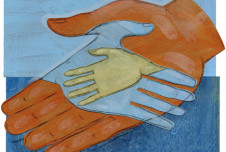Delores was good natured and attractive, but I could see the hurt in her eyes and the sorrow in the way she held herself. Though her parents were successful businesspeople who raised her in an upper middle-class neighborhood, her mother was cold and critical, while her father was quiet and aloof. Delores grew up feeling unattractive and uncared for, and she struggled to create strong relationships.
When Delores was 30, her fiancé Skip decided he was more interested in sleeping with local waitresses than remaining faithful to her. One day she came home and found him in bed with someone else. She saw this betrayal as an example of how unfair the world was—as proof that she never got a break. She was angry, hurt, confused, scared, and lonely. Skip moved out, but Delores constantly thought of begging him to return.
 © Jake Oktawiec
© Jake Oktawiec
I met Delores when she came to a class I teach to help people learn to forgive others. She rarely spoke without mentioning at least one of the many people who had done her wrong. When she began the forgiveness training, she doubted it would do her any good. She was there because her therapist had recommended the class.
I’ve known many people like Delores. There’s no shortage of people in the world who’ve been hurt—by someone they love, by a friend, by someone they didn’t know at all. My classes rest on the simple and radical notion that how we react to these hurts is up to us. I teach people to make forgiving choices.
For eight years, I have directed the Stanford Forgiveness Projects, the largest interpersonal forgiveness training research -projects ever conducted. In conjunction with this research, I teach classes and workshops that offer a concrete method for forgiving others. I stress that while pain and disappointment are inevitable, they need not control us. It is vital to our health and well-being that we handle what comes our way without getting mired in blame and suffering.
Through my research and teaching, I have found that forgiveness isn’t just wishful thinking. It’s a trainable skill. My colleagues and I have developed a nine-step method for forgiving almost any conceivable hurt. We have tested this method through a series of studies with people who had been lied to, cheated, abandoned, beaten, abused, or had their children murdered. They ranged from neglected spouses to the parents of terrorist victims in Northern Ireland.
What we have found is that forgiveness can reduce stress, blood pressure, anger, depression, and hurt, and it can increase optimism, hope, compassion, and physical vitality. For instance, in a study we conducted with Protestants and Catholics from Northern Ireland who had lost a family member in the violence there, participants reported a 40 percent decline in symptoms of depression after undergoing the forgiveness training. Another study involved people who had suffered a variety of hurts, from business partners lying to them to best friends abandoning them. Six months after their forgiveness training, these people reported a 70 percent drop in the degree of hurt they felt toward the person who had hurt them, and they said they felt more forgiving in general.
This does not mean that forgiveness is ever easy. It certainly wasn’t easy for Delores. But forgiveness was something she could learn to practice, even if it didn’t come naturally to her. Difficult as it was, Delores’s experience is emblematic of many others I’ve seen through this forgiveness training. Each story is different, but most follow a similar trajectory across the nine steps of forgiveness.
First Step
Delores had mastered the first step before we even met: she determined what she did not like about her fiancé’s behavior and knew in gruesome detail how she felt about it. She told anyone willing to listen what a louse Skip was.
Learning the second and third steps of forgiveness was more difficult. Even a year after Skip had cheated on her, Delores was in so much pain that she could not think straight. At first, healing meant only that she would revive her relationship with Skip. It was a struggle for her to want to heal just for her own well-being. In fact, Delores considered taking her fiancé back because she did not think other men would ever find her attractive. In her mind, Skip was the cause of, and the solution to, her problem.
Delores thought forgiving condemned her to being a doormat her entire life. She thought it meant staying with Skip and overlooking his cheating. She suffered under the misconception that forgiving Skip meant condoning his actions, or that it meant forgetting what had happened.
In truth, these things are very different. Forgiving someone does not mean forgetting or approving of hurtful events in the past. Rather, it means letting go of your hurt and anger, and not making someone endlessly responsible for your emotional well-being. Delores struggled to understand how controlling the way she felt in the present was more important than reviewing what happened to her in the past. She had trained herself to talk relentlessly of her past and of how her parents and poor relationships limited her options and happiness. It was hard for her to understand that constantly focusing on the past was the reason for her current distress.
I emphasized to Delores that she could not change the hurtful parts of the past, but only how much space she rented to them in her mind. By putting less blame on the past, she could change the way she felt in the present.
Glimmers of Peace
Delores got her first glimpse at an alternate way of living when she started to practice stress management every time she thought of Skip. She saw, if only for an instant, that breathing slowly and deeply affected how she felt. It gave her body and mind a break, and a glimmer of peace. When she did not practice, she remained in a state of upset and continually blamed her ex-fiancé for how she felt. After a few weeks of this pattern, she started to understand that she could reclaim her emotional life.
Delores simultaneously experimented with challenging what I call “unenforceable rules.” By unenforceable rules, I mean the desires we have that we are simply powerless to turn into realities. For instance, while Delores wanted Skip to love and be faithful to her, it was clear that there was no way to make him do so. His behavior was a constant reminder that he did what he wanted and she had limited power over him. Delores also started to examine her theory that her parents had ruined her life. She noticed that she had an “unenforceable rule” that her parents must love her and treat her with kindness. Her parents had treated Delores the best they could, which included some cruelty and lack of care. Her parents’ behavior was a reminder that no matter how much Delores wanted things to go her way, she did not have the power to control either the past or other people’s behavior. By continuing to insist that her past should somehow change, Delores was dooming herself to endless blame, offense, and suffering.
As the forgiveness training progressed, Delores began to look at her suffering and ask herself what “unenforceable rule” she was trying to enforce. I reminded her that she would not be so upset unless she was trying to change something that was impossible for her to change. Delores saw that trying to change her ex-fiancé’s behavior would always lead to pain and helplessness. She saw that just because she hoped for something, it did not have to come true. She understood that she would not be continuously upset if her rules for life were more in line with reality.
Therefore, Delores took it upon herself to create more enforceable rules. She was finally able to ask herself the revealing question, “What do I really want?” What she wanted was happiness, confidence, and peace of mind—things only she could provide for herself. Through asking this question, she saw that Skip and her parents did not have to remain in control of her life. Because of this insight, she started to work on her “positive intention,” or life goals described only in positive terms. She realized that her positive goals were to learn how to value herself and her actions, as opposed to capturing someone to affirm her. She saw that it was more important for her to feel good about herself than it was for other people to feel good about her. Identifying these goals helped Delores to focus more on creating her future and less on lamenting her past.
In response, she concentrated on learning about herself and approving of herself. She talked about blaming other people and holding onto the past as impediments to her goal of healing. She told me how she was entering counseling, looking for male friends and not lovers, and appreciating her good qualities. She did not gloss over the difficulties she faced—there is no miracle cure for life’s struggles.
Delores found that this strategy helped her free up mental space so she could uncover other ways to meet her needs. She realized that neither Skip nor her parents were ever going to approve of her in the way she wanted. She was going to have to find that in herself. Her old habit had been to see her glass as empty. She started retraining her mind to see where her cup might already be full.
Delores looked at her life and saw that she had good friends and was capable of doing well at work. She found appreciation for her parents’ business acumen and the freedom their financial success granted her to attend college full-time without accruing any loans. She started to enjoy the beautiful area in which she lived, and she gave herself credit for her excellent exercise routine.
Delores also practiced gratitude when doing ordinary, everyday tasks. She found that one can be thankful for anything at any time, whether it’s the beauty of the trees one passes while driving, the phenomenon of one’s breathing, or the embarrassing riches of twenty-first-century America. When shopping, she made it a point to marvel at the opportunities she had to purchase a stupendous array of items. She learned to stop for a minute at the local shopping mall and say thanks to all of the people working there. She would walk into her local supermarket and take a moment to appreciate the abundance of food choices in front of her.
Delores had experienced the pain of parents who were more interested in their business than in caring for her. She had dwelled for years on what she had lost. Now she saw that her parents’ financial success was also a blessing. She was able to appreciate the hard work they put in to provide a life for her. Delores practiced and saw the value of the old adage that a life well lived is the best revenge.
Moving On
When I bumped into Delores a year after her forgiveness classes ended, it was rewarding to see the changes in her. She was filled with energy and showed a lovely smile. When I asked her about Skip, she almost responded, “Skip who?” Instead of Skip, she wanted to talk about how much she had learned about herself. When I asked about her parents, she said her relationship with them had improved. Delores accepted what they could offer and realized their enormous emotional limitations. As an adult she understood that she was the one with the best chance to create a good life for herself. She was learning to let her parents off the hook. She forgave them for their mistakes.
The biggest change in Delores was the way she turned her grievances into more positive stories about herself. She talked with pride of forgiving Skip and learning how to take care of herself. Delores was a woman who took her forgiveness training to heart. She completed the full nine steps and now presented herself as a hero and not a victim. Forgiveness brought her a sense of peace that had previously eluded her.
Of course, she did not always have it easy. She still longed for a loving and tight family and a faithful partner. When she found the longing overpowering, she told herself to make the best of what she had. She would take a walk and remind herself of the blessings of a beautiful day or the possibilities the future might bring. And sometimes, like the rest of us, there were times when she was simply unhappy.
To become a forgiving person, we have to practice forgiving smaller grievances. Then, when a bigger insult comes, we are ready, willing, and able to deal with it. Alternatively, like Delores, once we learn to forgive a major grievance, we can understand the value of limiting the power that pain and anger hold over us the next time we are hurt. No one can make the people in life behave kindly, fairly, or honestly at all times. We cannot end the cruelty on this planet. What we can do is forgive the unkindness that comes our way and put energy toward meeting our positive goals. Then we can help others do the same.
Forgiveness, like other positive emotions such as hope, compassion, and appreciation, is a natural expression of our humanity. These emotions exist within a deep part of each of us. Like many things, they require practice to perfect, but with this practice they become stronger and easier to find. Ultimately, they can be as natural to us as anger and bitterness. It takes a willingness to practice forgiveness day after day to see its profound benefits to physical and emotional well-being and to our relationships. Perhaps the most fundamental benefit of forgiveness is that over time it allows us access to the loving emotions that can lie buried beneath grievances and grudges.




Comments